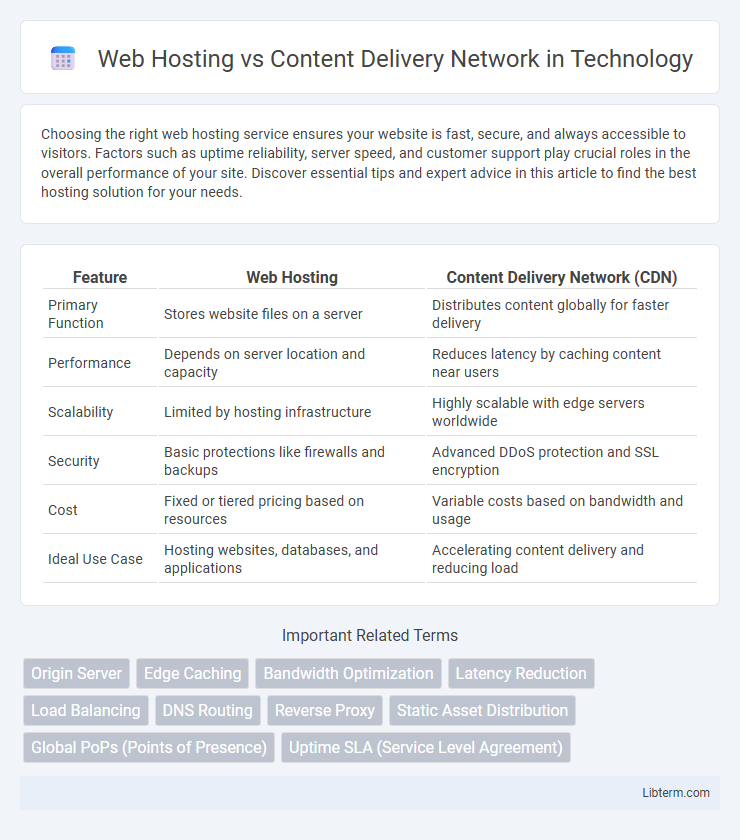Choosing the right web hosting service ensures your website is fast, secure, and always accessible to visitors. Factors such as uptime reliability, server speed, and customer support play crucial roles in the overall performance of your site. Discover essential tips and expert advice in this article to find the best hosting solution for your needs.
Table of Comparison
| Feature | Web Hosting | Content Delivery Network (CDN) |
|---|---|---|
| Primary Function | Stores website files on a server | Distributes content globally for faster delivery |
| Performance | Depends on server location and capacity | Reduces latency by caching content near users |
| Scalability | Limited by hosting infrastructure | Highly scalable with edge servers worldwide |
| Security | Basic protections like firewalls and backups | Advanced DDoS protection and SSL encryption |
| Cost | Fixed or tiered pricing based on resources | Variable costs based on bandwidth and usage |
| Ideal Use Case | Hosting websites, databases, and applications | Accelerating content delivery and reducing load |
Introduction to Web Hosting and Content Delivery Networks
Web hosting involves storing website files on a server to make them accessible via the internet, while a Content Delivery Network (CDN) distributes these files across multiple global servers to enhance website speed and reliability. Web hosting provides the primary infrastructure for website availability, whereas CDNs optimize content delivery by reducing latency and improving load times. Together, they form a complementary ecosystem that ensures efficient website performance and user experience.
Core Functions: Web Hosting vs. CDN
Web hosting provides the essential infrastructure to store and serve website files on internet servers, enabling websites to be accessible online. Content Delivery Networks (CDNs) optimize performance by distributing cached copies of content across multiple global edge servers, reducing latency and improving load times for users regardless of geographic location. While web hosting ensures website availability, CDNs enhance speed, reliability, and security through traffic load balancing and DDoS protection.
How Web Hosting Works
Web hosting works by storing website files on servers that are connected to the internet, allowing users to access the site through a domain name. When a user requests a webpage, the web hosting server delivers the necessary files, including HTML, CSS, images, and scripts, to the user's browser. Unlike content delivery networks (CDNs) that cache content across multiple servers worldwide to improve load times, web hosting primarily manages the original website data on centralized servers.
Understanding Content Delivery Networks
Content Delivery Networks (CDNs) are geographically distributed servers designed to deliver web content and media efficiently by caching copies closer to users, significantly reducing latency and improving load times. Unlike traditional web hosting, which relies on a single centralized server, CDNs enhance website performance, scalability, and reliability by distributing traffic across multiple nodes worldwide. Understanding CDNs involves recognizing their role in optimizing content delivery, minimizing bandwidth costs, and enhancing security through features like DDoS protection and secure token authentication.
Performance Comparison: Speed and Reliability
Web hosting provides the foundational infrastructure for storing and serving website files, ensuring reliable uptime but may be limited by server location leading to slower load times for distant users. Content Delivery Networks (CDNs) optimize performance by caching content across multiple geographically distributed servers, drastically reducing latency and improving speed for global audiences. Combining web hosting with a CDN significantly enhances reliability and load speed by minimizing server response time and distributing traffic efficiently.
Security Features: Web Hosting vs. CDN
Web hosting providers implement security measures such as firewalls, SSL certificates, and regular malware scans to protect hosted websites from attacks and unauthorized access. Content Delivery Networks (CDNs) enhance security by distributing content across multiple servers globally, mitigating DDoS attacks, and providing web application firewalls (WAFs) that protect against SQL injection and cross-site scripting. Combining web hosting security with CDN features creates a comprehensive defense, improving both site performance and resilience against cyber threats.
Scalability and Global Reach
Web hosting provides the foundational infrastructure to store and serve website content but often faces limitations in scalability due to server capacity and geographic location. Content Delivery Networks (CDNs) enhance scalability by distributing cached content across multiple global edge servers, reducing latency and balancing traffic loads effectively. This distributed architecture enables superior global reach, ensuring faster content delivery and improved user experience regardless of the visitor's location.
Cost Differences and Pricing Models
Web hosting typically involves a fixed monthly or annual fee based on server resources such as storage, bandwidth, and the type of hosting (shared, VPS, dedicated), while content delivery networks (CDNs) often use pay-as-you-go pricing models based on data transfer and number of requests. Web hosting plans can range from $3 to $100+ per month depending on features, whereas CDN costs start low but scale with traffic volume, often charging per gigabyte of data delivered. Businesses with fluctuating traffic may benefit from CDN's scalable pricing, while consistent, predictable workloads might find traditional web hosting more cost-effective.
When to Use Web Hosting, CDN, or Both
Use web hosting when you need reliable server space for storing website files, managing databases, and handling backend operations essential for site functionality. Opt for a Content Delivery Network (CDN) to improve site speed and performance by distributing content across multiple geographically dispersed servers, reducing latency for global users. Combining both web hosting and CDN is ideal for websites with high traffic and a diverse audience, ensuring efficient content delivery and robust server management.
Conclusion: Choosing the Right Solution for Your Website
Selecting the right solution between web hosting and a content delivery network (CDN) depends on your website's needs for speed, scalability, and reliability. Web hosting provides essential server resources and storage for your website files, while CDNs enhance performance by distributing content globally to reduce latency. For optimal results, combine quality web hosting with a robust CDN to ensure fast load times, improved user experience, and better SEO rankings.
Web Hosting Infographic

 libterm.com
libterm.com